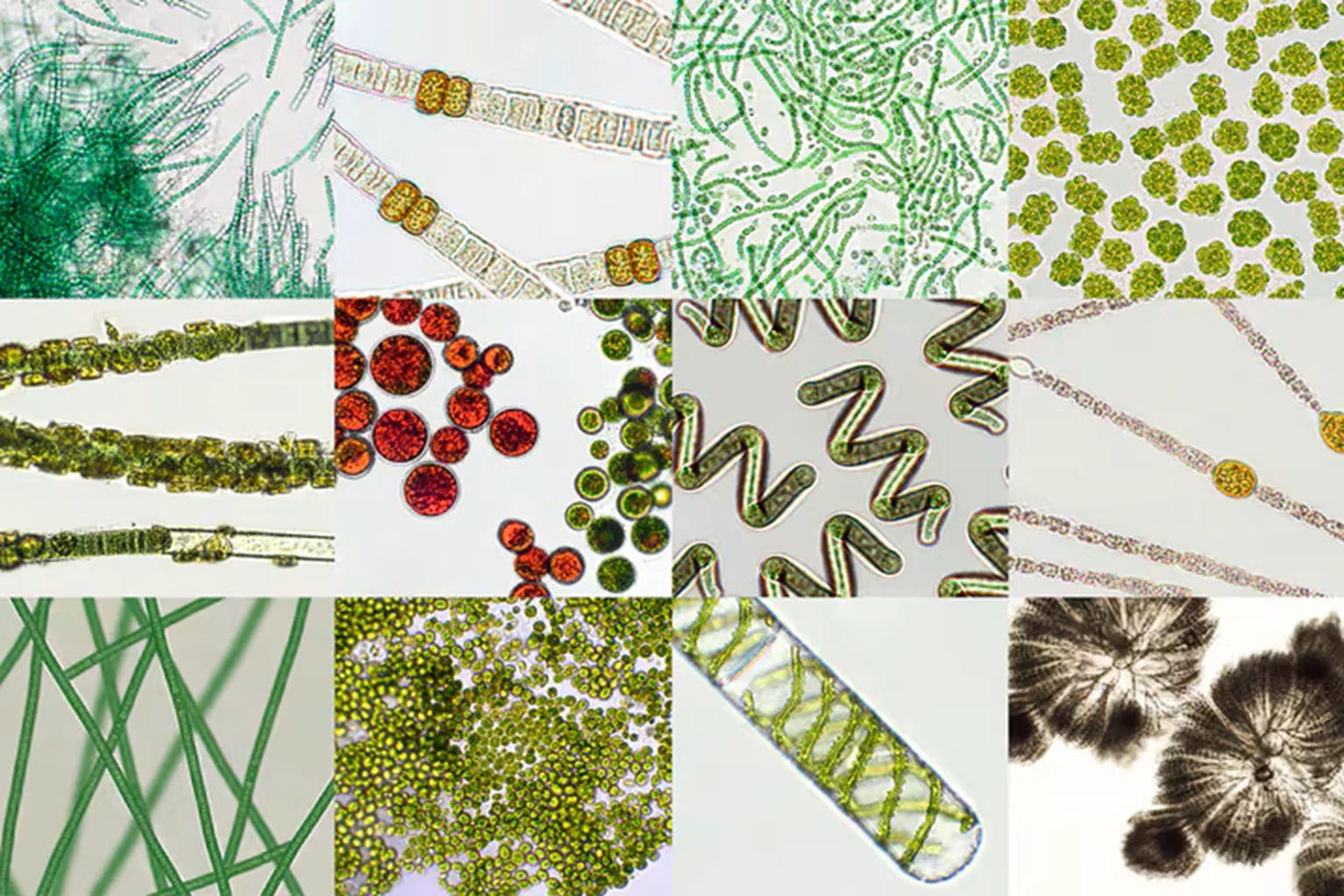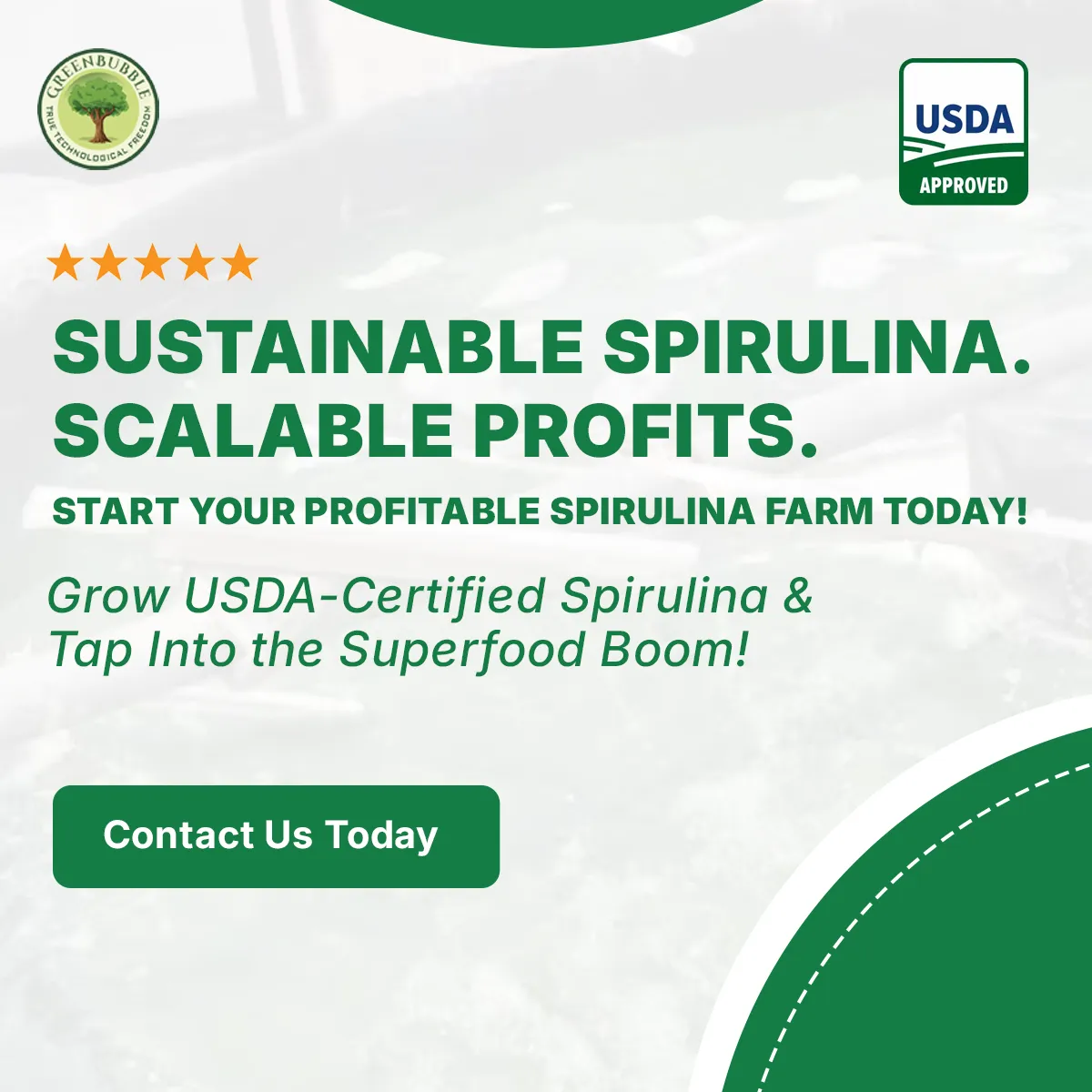Algae is one of the oldest life forms on Earth—but in today’s food and biotech industry, it’s among the most promising solutions for sustainability, nutrition, and climate resilience.
While spirulina has gained superstar status as a “superfood,” it’s not the only edible algae out there. From chlorella and dunaliella to seaweeds like kelp and nori, each has its niche. Yet, if you’re exploring spirulina farming or considering algae-based products, you need to know: What really sets spirulina apart?
This article breaks down the key differences between spirulina and other algae, across categories like biology, nutrition, cultivation methods, market demand, and price.
Let’s separate the facts from the foam.
1. Biological Differences: Cyanobacteria vs. True Algae
Spirulina isn’t technically an “algae” in the botanical sense—it’s a cyanobacterium, a group of photosynthetic microbes that thrive in alkaline water. It behaves like algae in terms of photosynthesis, but its cell structure is fundamentally different.
In contrast:
- Chlorella is a single-celled green algae
- Dunaliella salina is a microalga rich in β-carotene
- Kelp, Nori, and Wakame are macroalgae (seaweeds), which are multicellular and marine
Key difference?
Spirulina lacks a rigid cell wall, making it easier to digest and absorb, unlike chlorella which requires cell wall cracking during processing.
➡️ Read how spirulina’s biology influences farming in Spirulina Cultivation Best Practices and Techniques
2. Nutritional Comparison: Why Spirulina Tops the List
Let’s break it down per 100g of dry weight:
| Nutrient | Spirulina | Chlorella | Dunaliella | Seaweed (avg) |
| Protein | 60–65% | 50–60% | ~30% | 5–10% |
| Iron | 410 mg | 130 mg | ~50 mg | 2–10 mg |
| β-Carotene | 5500 mg | 2500 mg | 8000–10,000 mg | 300–600 mg |
| B12 (pseudo) | Present (inactive) | Present (inactive) | Absent | Absent |
| Chlorophyll | High | High | Moderate | Low |
| Digestibility | Excellent | Moderate (requires processing) | Good | Moderate |
Why spirulina wins:
- Complete protein profile (contains all essential amino acids)
- High iron + antioxidant content
- Naturally bioavailable (no harsh processing needed)
- Lower risk of iodine overdose compared to marine algae
➡️ Learn more in Spirulina Quality Control in Mass Production
3. Cultivation: Spirulina Is Scalable & Soil-Free
Spirulina is grown in shallow open-air raceway ponds, using fresh or brackish water made alkaline with sodium bicarbonate and nutrients. Its growth is predictable, scalable, and climate-resilient.
Compare that with:
- Chlorella: Needs closed bioreactors or photobioreactors to avoid contamination
- Dunaliella: Thrives only in highly saline environments—limits location choices
- Seaweeds: Grown in coastal waters; exposed to marine pollution, difficult to trace
Spirulina cultivation is:
- Soilless and independent of seasons
- Suited to smart agriculture and IoT
- Viable in arid/semi-arid regions with solar drying setups
That’s why spirulina has become the go-to crop for startups, sustainable farms, and agripreneurs in India.
➡️ Learn more about setup needs in Spirulina Farming Costs and Profits
4. Market Demand & Pricing: Spirulina Fetches the Premium
In terms of market price, spirulina stands tall among algae:
| Product Type | Avg. Price (India) | Global Premium Price |
| Spirulina Powder (Non-Organic) | ₹600–₹900/kg | $15–$20/kg |
| Spirulina Powder (Organic) | ₹1500–₹2200/kg | $30–$40/kg |
| Chlorella Powder | ₹1000–₹1500/kg | $20–$30/kg |
| Seaweed Flakes (Dried) | ₹300–₹600/kg | $8–$12/kg |
| Dunaliella Extract (Pigment) | High, niche market | Very high ($100+/kg) |
Why does spirulina command more?
- Better digestibility
- Bulk use across health, pharma, cosmetics
- Easier to farm at scale
- Certifiable under USDA/EU Organic, HACCP, ISO 22000
While other algae are valuable in specialized niches, spirulina is mass-consumable and market-ready.
➡️ See real-world applications in Market Trends and Opportunities
5. Regulation & Compliance: Spirulina Leads in Traceability
For edible algae, especially in nutraceuticals, quality control and documentation matter. Spirulina stands out in this area:
- COA (Certificate of Analysis) can be generated batch-wise
- Easy testing for protein %, heavy metals, and microbes
- Supports batch traceability and clean labeling
- Export-ready with compliance to global food safety codes
In contrast, seaweeds and other marine algae often face:
- Unpredictable nutrient profiles
- Iodine regulation concerns
- Contamination from heavy metals (ocean pollutants)
If you’re planning to launch an FSSAI-approved supplement or export to the EU/US, spirulina simplifies your path.
6. Innovation Potential: Spirulina Is Future-Ready
Startups across India and the globe are using spirulina to create:
- Immunity shots
- Vegan capsules
- Functional chocolates
- Spirulina-enriched pet food
- Phycocyanin colorants (natural blue)
It also pairs well with:
- Moringa
- Amla
- Turmeric
- Mushroom extracts
- Collagen (for skin-focused blends)
This formulation flexibility makes spirulina an innovation magnet. In contrast, most other algae serve single-function use cases like thickening (agar/seaweed) or pigmentation (dunaliella).
➡️ Need product ideas? Check Spirulina Farming for the Future
Final Thoughts: Should You Focus on Spirulina or Other Algae?
It depends on your goals.
| If You Want… | Go For… |
| Mass market nutrition + scalability | ✅ Spirulina |
| A premium pigment niche (β-carotene) | Dunaliella salina |
| Prebiotic sea vegetables | Kelp, Wakame |
| Closed bioreactor R&D projects | Chlorella |
| Vegan protein startup | ✅ Spirulina |
Verdict:
For entrepreneurs looking to launch a farm, export a supplement, or build a health brand, spirulina is the most versatile, scalable, and profitable algae-based path.
Add to that India’s climate advantage, growing demand, and available government support—there’s no better time to start.
➡️ Want to explore the business side? See Spirulina Farming as a Sustainable Business
Ready to Build Your Spirulina Ecosystem?
At Greenbubble, we help you turn land into a high-yield, traceable spirulina farm—from design and automation to COA systems and drying equipment. Whether you’re competing with other algae or trying to dominate spirulina, we’ll help you scale smart.
👉 Contact us today for turnkey spirulina farming consultancy and equipment planning.


